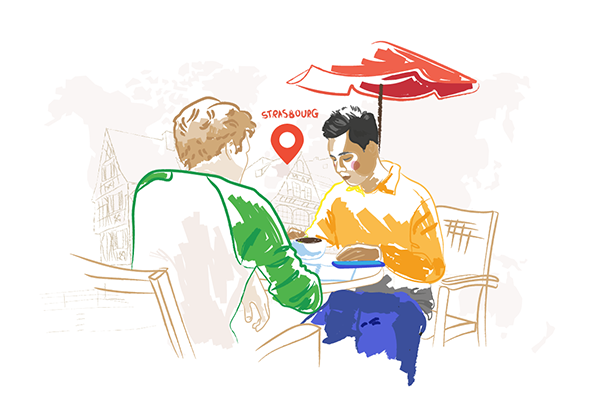I am in Strasbourg
If you are a non-European Union citizen, you were able to enter French territory with a visa. Depending on the duration of your stay and your status, once you have arrived in France, you will need to validate your visa or apply for a residence permit.
![]() Researcher
Researcher
For researchers, the visa-related procedures once you have entered French territory will depend on the length of your stay and the type of visa you hold:
- A short-stay visa will not require any additional steps;
- Validation will be necessary for a long-stay visa equivalent to a residence permit (VLS-TS) within two months of your arrival in France;
- Long-stay visa (VLS) holders will need to apply for a residence permit before the visa's expiration date (which is three months after obtaining it).
- Draw up your budget and seek financial support if necessary;
- Find out where to look for accommodation.
- Found the perfect ad for you? Find out what you need to do before you move in.
- Signed your lease? We have some tips on how to live in your new home stress-free.
One of the first steps when you arrive in Strasbourg is to get affiliated with social security to access healthcare. In France, healthcare, whether public or private, is mandatory.
![]() Researcher
Researcher
As a researcher, the terms of your affiliation with social security and your primary healthcare provider will depend on several factors:
- Your country of origin;
- The duration of your stay;
- Your residence permit;
- Your funding.
Depending on your specific situation, you may be affiliated with the CPAM (Caisse Primaire d'Assurance Maladie) in Paris or the CPAM in Bas-Rhin, and your affiliation can either be retroactive from the first day of your contract or based on residency criteria after a minimum of three months in France.
Opening a bank account in France might be very useful, mainly to pay your bills (electricity, phone bill, rent, transportation, Wi-Fi) but also to simplify the process of getting your potential wages and healthcare. A French debit card allows you to take care of the majority of your expenses without having to carry big amounts of cash around.
![]()
![]() Campus Pass
Campus Pass
Once you have arrived at the University of Strasbourg, remember to request your Pass Campus. This card, designed for students, staff, and guests of the University of Strasbourg, allows you to borrow from libraries, pay for your meals at CROUS, and access certain secured buildings. The Pass Campus also serves as proof of your student or university employee status.
![]()
![]() Culture and Language
Culture and Language
When arriving in a new city and a new country, you will encounter interculturality and the challenge of adapting to French culture and language, as well as the specificities of Strasbourg and Alsace. To understand this new cultural and linguistic environment, we recommend:
- Learning French;
- Exploring Alsace;
- Participating in cultural activities.
![]()
![]() Daily Living and Getting Around
Daily Living and Getting Around
The University of Strasbourg, with its rich and complex history, comprises six main campuses and a significant number of educational buildings, libraries, and university restaurants. To get around on the several campuses and in Strasbourg, we invite you to:
- Check out the campus map;
- Discover the history of our university;
- Consult the access conditions for libraries and university restaurants;
- Find out how to engage in sports;
- Learn about transportation in Strasbourg.
